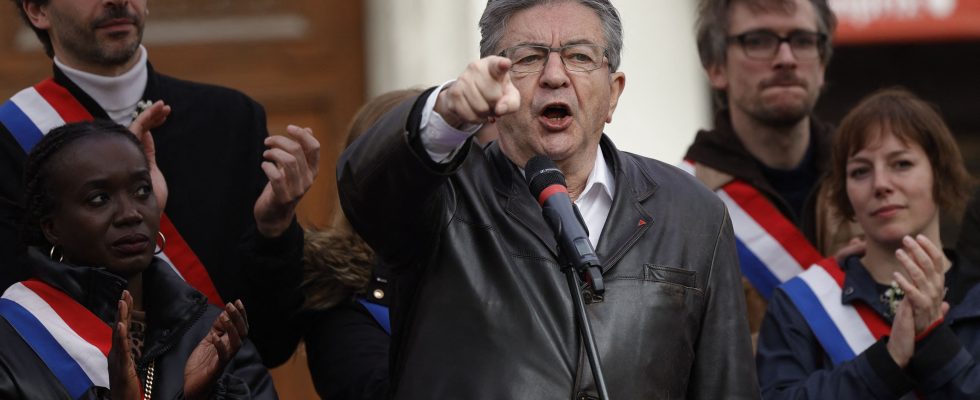How did we get here? This is the title of Jean-François Kahn’s latest book (Ed. L’Observatoire). And the question with which many of our public debates in recent years could open. Three weeks after seven nights of riots shook the country, the famous journalist deciphers the political lessons of these events.
L’Express: In your opinion, what will be the political consequences of the events we have experienced?
Jean-Francois Kahn: The consequences of these few days of riotous activism will be profound and disastrous for those who have refused, and still refuse, either to analyze the disturbing causes, or to admit their real nature. Double denial of reality. We had an illustration of this with the total failure of the demonstrations supported by a hundred left and far left organizations against “police violence”: 60 demonstrators per organization! What we risk ending up with is a double separatism: on the one hand, a whole fraction of the youth of the estates – as they say – and beyond, taking root in a kind of mental secessionism; and, on the other hand, the rural populations as well as the middle and working classes of the urban centres, who will tend to perceive any form of peripheral identity or social anger as an attack of separatism, including religious and ethnic.
In another time, the trade union forces and the left organizations, including the Communist Party, anchored to the various occurrences of popular expressions, could have prevented this formidable split. But their almost total expulsion from the universe in which the rioters thrived no longer confronts two social forces but two worlds that no longer listen to each other, no longer get along. Politically, this will result in a shift towards the extreme right of the lower middle classes and the working classes, the most directly confronted with the irruption of a new people of which they believed to be part and which they now perceive as different.
How do you interpret the position of Jean-Luc Mélenchon and those who followed him? Can his strategy pay off?
Three elements, it seems to me, shed light on Mélenchon’s evolution to the point of making him embody the negation of what he was. First, the succession of his successes and his failures helping, the exacerbation of a narcissistic egotism which transformed him into a true guru of a sect. Then, the intoxicating conviction that his word makes it possible to start or maintain fires whatever the consequences. The electoral observation that it is within the populations having massively voted for him (in Seine-Saint-Denis for example) that the rioting effervescences took on the greatest extent. Hence the choice, which the communist Fabien Roussel did not make, to prefer to lose a large fraction of the electorate of the traditional left made up of salaried workers, rather than this electorate. In this case, the rebels who mechanically call for the “convergence of struggles” have shown themselves incapable of bringing together these two popular sensitivities. They even largely contributed to exacerbate their differences.
The third reason that explains the positioning of Mélenchon and his close guard is that they have integrated the fact that they have little chance of winning the next elections. From then on – even if it means favoring it – a victory for the far right will rid them of Macronism – their obsession – but above all will create, they foresee and even hope, a climate of civil war of which, on the subject of the anti-fascism, they would be the main profiteers. This strategy, throughout history, has everywhere and always ended in failure. But it is because they continue to adhere to it and to wait for a miracle that the “mélenchonistes” mentally exorcise, until the most incredible blindness, the evidence of their fall which involves, today, that of all the left. Just as they speak to another people, they live in another world.
The political and media debate seemed to be divided, roughly, between those who find excuses for the rioters and those who find excuses for the police. Is this representative of what the French think?
What is lamentable is that, if you speak to people, I would dare say, “ordinary”, you find few who deny, excuse or applaud police violence. But also very few who deny, excuse or tolerate the type of behavior which is not part of a legitimate social revolt, but rather of a fascination with the most radically reactionary practice of the law of the jungle, the law of stronger: adhesion to all forms of competition and savage antagonisms, fascination with money and symbols of luxury, lure of gain in all its forms except those provided by work, rejection of public services and services, destructive hatred of everything that is in their eyes collective, bursts of ethnicism and retrograde fideism.
New media economy obliges, these events saturate the space for a few days, then are swept away by the following news. Politically, we rely on the famous “resilience” of society to move on. However, do these crises not leave a lasting mark?
The problem is that the grip of radicalism on the media space has the consequence that we no longer hear anything but activist minorities who either equate delinquency with legitimate social protest, or end up advocating the establishment of a police regime.
From where, two evolutions towards the extremes. That of the right, which comes to repudiate the very concept of moderation and to endorse the essence of the Zemmourian discourse. That of a left that comes to declare, like the Stalinists yesterday, that centrism is a variation of fascism.
These two heavinesses are reminiscent of those that led to the disaster that we know about in Europe in the 1930s. And, if we weren’t careful, they would normalize a climate of civil war to the benefit of mutually sustaining extremes. But only one of which would be guaranteed to win.
